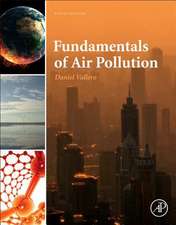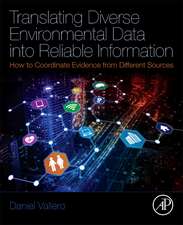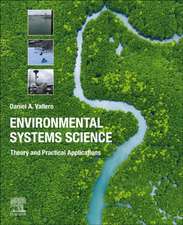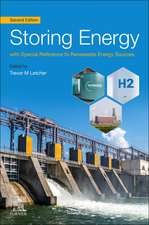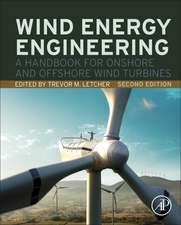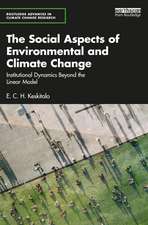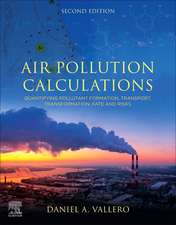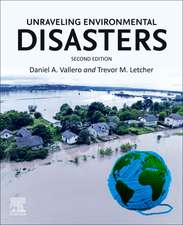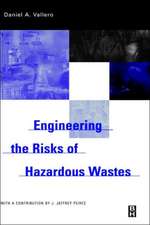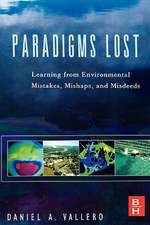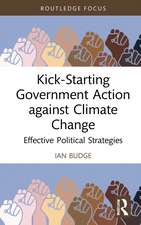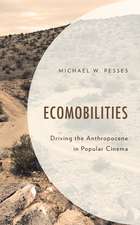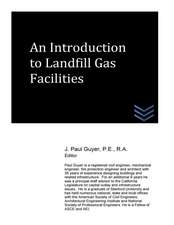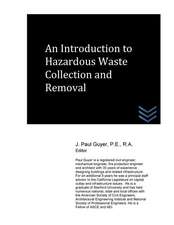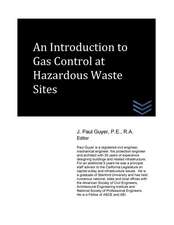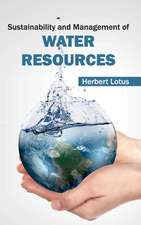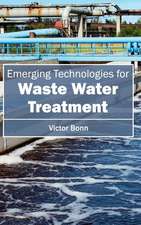Waste: A Handbook for Management
Editat de Trevor Letcher, Daniel A. Valleroen Limba Engleză Paperback – 5 mar 2019
With an overall focus on waste recovery, reuse, prevention and lifecycle analysis, the book draws on the experience of an international team of expert contributors to provide reliable guidance on how best to manage wastes for scientists, managers, engineers and policymakers in both the private and public sectors.
- Covers the assessment and treatment of different waste streams in a single book
- Provides a hands-on report on each type of waste problem as written by an expert in the field
- Highlights new findings and evolving problems in waste management via discussion boxes
Preț: 704.30 lei
Preț vechi: 888.27 lei
-21% Nou
Puncte Express: 1056
Preț estimativ în valută:
134.79€ • 140.20$ • 111.27£
134.79€ • 140.20$ • 111.27£
Carte tipărită la comandă
Livrare economică 08-22 aprilie
Preluare comenzi: 021 569.72.76
Specificații
ISBN-13: 9780128150603
ISBN-10: 0128150602
Pagini: 803
Dimensiuni: 191 x 235 x 46 mm
Greutate: 1.36 kg
Ediția:2
Editura: ELSEVIER SCIENCE
ISBN-10: 0128150602
Pagini: 803
Dimensiuni: 191 x 235 x 46 mm
Greutate: 1.36 kg
Ediția:2
Editura: ELSEVIER SCIENCE
Public țintă
Scientists, engineers, legislators and collaborators in all areas of waste management, including environmental scientists and engineers in both academia and industry, government officials, waste managers, technicians, and maintenance personnelCuprins
A. INTRODUCTION
1. Introduction to Waste Management
2. A Systems Approach to Waste Management
3. Regulation of Wastes
4. Waste Collection
5. Waste and Biogeochemical Cycling
B. WASTE STREAMS (and their treatment)
6. Mine Waste: A Brief Overview of Origins, Quantities, and Methods of Storage
7. Coal Waste Streams
8. Effect of Waste on Ecosystems
9. Oil and Gas Exploration and Production Wastes
10. Metal Waste
11. Radioactive Waste Management
12. The Municipal Landfill
13. Wastewater
14. Recovered Paper
15. Glass Waste
16. End-of-life textiles
17. Chemicals in Waste: Household Hazardous Waste
18. Reusing Non-hazardous Industrial Waste Across Business Clusters
19. Current and emerging construction waste management status, trends and approaches
20. Thermal Waste
21. Microplastics: emerging contaminants requiring multilevel management
22. Marine Plastic Pollution: other than micro-plastic
23. Plastic Waste: How Plastic has become Part of the Earth’s Geological Cycle
24. Air Pollution: Atmospheric Wastes
25. Waste: Electrical and Electronic Equipment
26. Tyre Recycling
27. Medical Waste
28. Agricultural Waste and Pollution
29. Waste from Military Operations
30. Space waste
31. Hazardous Waste
32. Land Pollution
C. BEST PRACTICE AND MANAGEMENT
33. Waste Governance
34. Waste Constituent Pathways
35. Waste Management Accountability: Risk, Reliability and Resilience
36. Evaluating the feasibility of Public Projects
1. Introduction to Waste Management
2. A Systems Approach to Waste Management
3. Regulation of Wastes
4. Waste Collection
5. Waste and Biogeochemical Cycling
B. WASTE STREAMS (and their treatment)
6. Mine Waste: A Brief Overview of Origins, Quantities, and Methods of Storage
7. Coal Waste Streams
8. Effect of Waste on Ecosystems
9. Oil and Gas Exploration and Production Wastes
10. Metal Waste
11. Radioactive Waste Management
12. The Municipal Landfill
13. Wastewater
14. Recovered Paper
15. Glass Waste
16. End-of-life textiles
17. Chemicals in Waste: Household Hazardous Waste
18. Reusing Non-hazardous Industrial Waste Across Business Clusters
19. Current and emerging construction waste management status, trends and approaches
20. Thermal Waste
21. Microplastics: emerging contaminants requiring multilevel management
22. Marine Plastic Pollution: other than micro-plastic
23. Plastic Waste: How Plastic has become Part of the Earth’s Geological Cycle
24. Air Pollution: Atmospheric Wastes
25. Waste: Electrical and Electronic Equipment
26. Tyre Recycling
27. Medical Waste
28. Agricultural Waste and Pollution
29. Waste from Military Operations
30. Space waste
31. Hazardous Waste
32. Land Pollution
C. BEST PRACTICE AND MANAGEMENT
33. Waste Governance
34. Waste Constituent Pathways
35. Waste Management Accountability: Risk, Reliability and Resilience
36. Evaluating the feasibility of Public Projects

